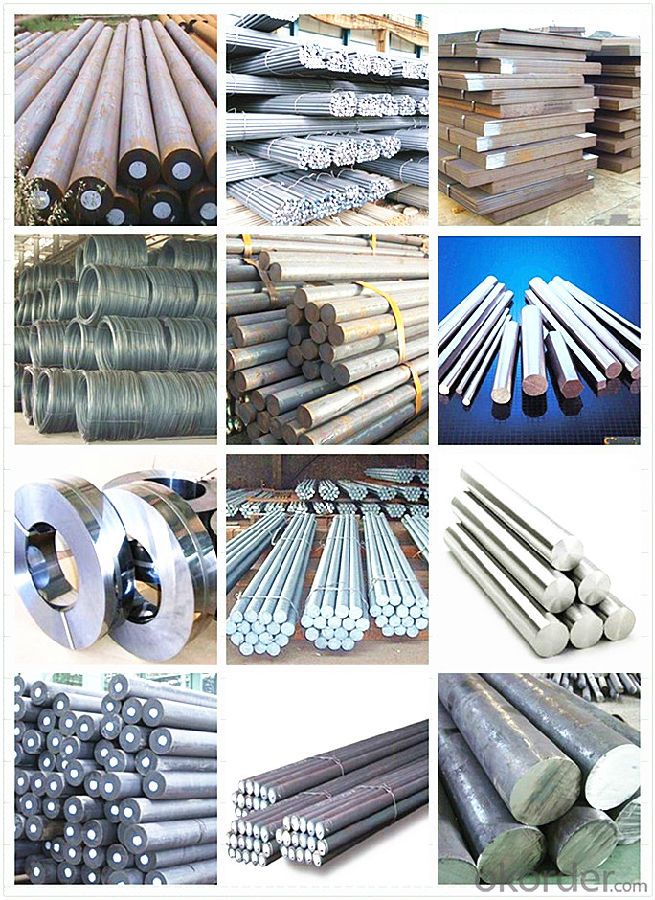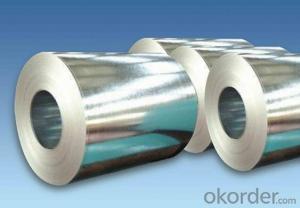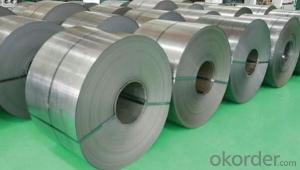HR Steel Coil SS400 A36 Q235 Q345 Q195 Hot Rolled Steel Coil
- Loading Port:
- Tianjin
- Payment Terms:
- TT or LC
- Min Order Qty:
- 50 m.t.
- Supply Capability:
- 10000 m.t./month
OKorder Service Pledge
OKorder Financial Service
You Might Also Like
Item specifice
HR Steel Coil SS400 A36 Q235 Q345 Q195 Hot Rolled Steel Coil
Quick Details
Name | Hot Rolled Steel Coil |
Standard | GB/ASTM/SAE/AISI/DIN/JIS/EN/BS |
Surface Treatment: | Black/Peeling/Polished/Machined |
Delivery Condition: | Hot Rolled or Forged/Peeled or Black Surface |
Test | SGS/UT 100% Elements Testing |
Certificate: | ISO/Mill Certificate |
Service: | 24 hours online service / |
more than 20 years trading and manufacture | |
Quality Assurance: | the third party inspection, such as SGS, BV, TUV…etc. is acceptable |
Packaging Details: | Seaworthy Packaging or as per customer's packing instruction |
Specification
Hot Rolled Steel Coil Specification : Width(mm)*Thickness(mm) | ||
145*2.5 | 255*2.2 | 315*2.75 |
156*1.3 | 255*2.3 | 355*1.5 |
156*1.5 | 255*2.5 | 335*1.7 |
156*1.8 | 272*1.5 | 335*1.8 |
156*2.0 | 272*1.7 | 335*2.0 |
183*1.2 | 272*1.8 | 335*2.2 |
183*1.3 | 272*2.0 | 335*2.3 |
183*1.5 | 272*2.2 | 335*2.5 |
183*2.0 | 272*2.3 | 355*1.5 |
196*1.3 | 272*2.5 | 355*1.7 |
196*1.5 | 295*1.5 | 355*1.8 |
196*1.7 | 295*1.7 | 355*2.0 |
196*1.8 | 295*1.8 | 355*2.2 |
196*2.0 | 295*2.0 | 355*2.3 |
196*2.2 | 295*2.2 | 355*2.5 |
196*2.3 | 295*2.3 | 385*2.5 |
196*2.5 | 295*2.5 | 385*2.75 |
232*1.0 | 295*2.75 | 395*2.5 |
232*1.3 | 305*1.5 | 395*2.75 |
232*1.5 | 305*1.7 | 395*3.5 |
232*1.7 | 305*1.8 | 395*3.75 |
232*1.8 | 305*2.0 | 395*4.0 |
232*2.0 | 305*2.2 | 406*2.0 |
232*2.2 | 305*2.3 | 406*2.3 |
232*2.3 | 305*2.5 | 413*2.0 |
232*2.5 | 315*1.5 | 434*3.0 |
255*1.0 | 315*1.7 | 485*3.0 |
255*1.3 | 315*1.8 | 512*3.75 |
255*1.5 | 315*2.0 | 515*2.5 |
255*1.7 | 315*2.2 | 515*4.2 |
255*1.8 | 315*2.3 | 515*3.0 |
255*2.0 | 315*2.5 | 515*4.75 |
Company Information
CNBM International Corporation is the most import and export platform of CNBM group(China National Building Material Group Corporation) ,which is a state-owned enterprise, ranked in 270th of Fortune Global 500 in 2015.
With its advantages, CNBM International are mainly concentrate on Cement, Glass, Iron and Steel, Ceramics industries and devotes herself for supplying high quality series of refractories as well as technical consultancies and logistics solution.
After-sale service | l CNBM provides the services and support you need for every step of our cooperation. We’re the business partners you can trust; you can relax and get on with doing business. |
l For any problem, please kindly contact us at any your convenient time, we’ll reply you in our first priority within 24 hours | |
Advantages | Industry experience over 20 years. |
Shipment of goods -More than 70 countries worldwide. | |
The most convenient transport and prompt delivery. | |
Competitive price with best service. | |
High technical production line with top quality products. | |
High reputation based on best quality products. |
Product Show

FAQ
Are you a trading company or manufacturer? | Manufacturer |
What’s the MOQ? | 3 metric ton |
What’s your delivery time? | 15-35 days after downpayment received |
Do you Accept OEM service? | Yes |
what’s your delivery terms? | FOB/CFR/CIF |
What's the Payment Terms? | 30% as deposit,70% before shipment by T/T |
Western Union acceptable for small amount. | |
L/C acceptable for large amount. | |
Scrow ,Paybal,Alipay are also ok | |
Why choose us? | Chose happens because of quality, then price, We can give you both. |
Additionally, we can also offer professional products inquiry, products knowledge train (for agents), smooth goods delivery, excellent customer solution proposals. | |
What's your available port of Shipment? | Main Port, China |
What’s your featured services? | Our service formula: good quality+ good price+ good service=customer's trust |
Where are your Market? | Covering more than 160 countries in the world |
- Q:What are the requirements for special steel used in automotive parts manufacturing?
- The requirements for special steel used in automotive parts manufacturing include high strength, durability, and resistance to impact and wear. It should also have excellent formability and weldability for easy shaping and joining processes. Additionally, the steel must meet specific standards for chemical composition, heat treatment, and surface finish to ensure optimal performance and safety in automotive applications.
- Q:Can special steel be used in the glass manufacturing industry?
- Yes, special steel can be used in the glass manufacturing industry. It is commonly used for the construction of glass molds and tools due to its high strength and resistance to heat and corrosion. Additionally, special steel can be used in glass manufacturing equipment such as furnace parts and rollers, helping to ensure the quality and efficiency of the glass production process.
- Q:What are the different methods of testing special steel for quality assurance?
- To ensure quality assurance, special steel undergoes testing using various methods. These methods are as follows: 1. Chemical Analysis: The composition of the steel is determined by analyzing its chemical elements and their respective quantities. This analysis ensures that the steel meets the specified requirements and is free from impurities. 2. Mechanical Testing: The strength, hardness, and other mechanical properties of the steel are assessed through mechanical testing. Tensile tests, hardness tests, impact tests, and fatigue tests are commonly performed to evaluate the steel's performance under different conditions and ensure it meets the required standards. 3. Non-Destructive Testing (NDT): NDT techniques are utilized to detect any surface or internal defects in the steel without causing damage. Magnetic particle testing, ultrasonic testing, radiographic testing, and dye penetrant testing are commonly employed methods for NDT. These tests are crucial in identifying flaws that may compromise the steel's structural integrity. 4. Metallurgical Analysis: The quality of the steel is assessed through microscopic examination of its microstructure. This analysis helps identify grain size variations, inclusions, or phase transformations that might affect the steel's performance. Metallography, optical microscopy, and electron microscopy are commonly used techniques for metallurgical analysis. 5. Corrosion Testing: Considering that special steel is often exposed to harsh environments, corrosion resistance is a critical quality parameter. Corrosion testing evaluates the steel's resistance to corrosion in various conditions. Salt spray testing, electrochemical testing, and exposure to corrosive environments are some methods used for corrosion testing. 6. Dimensional Inspection: Dimensional inspection ensures that the special steel meets the specified dimensional requirements. This involves measuring the steel's dimensions, including length, width, thickness, and other critical dimensions, using calibrated instruments. By employing these diverse methods, manufacturers can conduct thorough testing of special steel to ensure it meets the required quality standards. This comprehensive testing guarantees the steel's performance, durability, and reliability in various applications.
- Q:What grade of iron powder should be used for processing special steel? Are there any other elements on the request? How much are they?
- Special steel into high quality carbon steel, alloy steel, high alloy steel (alloy element is greater than 10%) three categories, including alloy steel and high alloy steel special steel production accounted for 70%.
- Q:What are the different heat-resistant grades of special steel?
- There exists a variety of specialized steel grades that possess heat-resistant properties and are specifically engineered to endure elevated temperatures and thermal stress. Some of the commonly utilized heat-resistant grades are as follows: 1. Stainless Steel 310: Renowned for its exceptional resistance against high temperatures, oxidation, and corrosion, stainless steel 310 is capable of withstanding temperatures up to 1100°C (2012°F). It finds extensive application in furnace components, heat treatment baskets, and other heat-intensive scenarios. 2. Inconel 600: Inconel 600 is a nickel-chromium alloy that exhibits remarkable resistance to high temperatures and oxidation. It remains effective within a temperature range spanning from cryogenic levels to 1093°C (2000°F) and is widely employed in gas turbines, heat exchangers, and other environments characterized by elevated temperatures. 3. Hastelloy C-276: Hastelloy C-276, a nickel-molybdenum-chromium alloy, offers outstanding resistance against a broad array of corrosive settings and high temperatures. It can withstand temperatures up to 1093°C (2000°F) and is commonly utilized in chemical processing, power generation, and pollution control applications. 4. Titanium Grade 2: Titanium Grade 2 is a commercially pure titanium alloy that presents favorable resistance to high temperatures and corrosion. It remains effective in temperatures up to 538°C (1000°F) and is frequently employed in heat exchangers, chemical processing equipment, and marine applications. 5. Alloy 617: Alloy 617 is a nickel-chromium-cobalt-molybdenum alloy that showcases exceptional strength and resistance to high-temperature environments. It can endure temperatures up to 1204°C (2200°F) and is commonly utilized in gas turbines, petrochemical plants, and other industries that entail significant heat exposure. These aforementioned examples represent merely a fraction of the heat-resistant grades of specialized steel accessible in the market. The appropriate grade selection relies on the specific temperature requirements, corrosion resistance, and mechanical properties demanded by the application at hand.
- Q:What are the challenges in working with special steel?
- Working with special steel presents several unique challenges compared to working with regular steel. Here are some of the main challenges one may encounter when working with special steel: 1. High cost: Special steels often have higher production costs due to their unique composition and properties. The raw materials used in their production may be rare or require complex manufacturing processes, leading to increased costs. 2. Limited availability: Special steels are not as widely available as regular steels, making it more challenging to source them. This limited availability can lead to longer lead times and potentially higher costs when trying to procure the necessary materials. 3. Complexity in machining: Special steels can be difficult to machine due to their high hardness or toughness. Their unique properties may cause excessive tool wear, leading to increased machining time and costs. Specialized cutting tools and machining techniques may be required to overcome these challenges. 4. Heat treatment requirements: Special steels often require precise and specific heat treatment processes to achieve the desired mechanical properties. The complexity of heat treatment can be a challenge, as it requires careful control of temperature, time, and cooling rates. Improper heat treatment can lead to inconsistent material properties or even material failure. 5. Weldability issues: Some special steels may have poor weldability compared to regular steels. They may be prone to cracking or require preheating and post-weld heat treatment to ensure proper joint integrity. This can add complexity and cost to welding processes. 6. Corrosion resistance: While special steels may possess excellent mechanical properties, they can sometimes be more susceptible to corrosion compared to regular steels. This requires additional measures to protect the steel from corrosion, such as applying protective coatings or using corrosion-resistant alloys. 7. Knowledge and expertise: Working with special steels often demands a higher level of technical knowledge and expertise. The unique properties and characteristics of these materials require a deep understanding of their behavior and how to effectively work with them. This may require specialized training or collaboration with experts in the field. Despite these challenges, working with special steel can also offer various benefits, such as superior strength, durability, and performance in specific applications. By understanding and addressing these challenges, engineers and manufacturers can harness the unique properties of special steel to develop innovative and high-quality products.
- Q:How does special steel compare to other materials?
- Special steel, also known as alloy steel, exhibits exceptional strength, durability, and resistance to wear and corrosion. When compared to other materials, such as regular steel, aluminum, and plastic, special steel stands out for its superior mechanical properties. Firstly, special steel offers higher tensile strength and hardness, making it ideal for applications requiring heavy-duty performance. Its resistance to deformation and ability to withstand high pressures and temperatures make it suitable for use in industries like aerospace, automotive, and construction. Moreover, special steel possesses excellent wear resistance, making it suitable for applications subject to friction, abrasion, and impact. This property minimizes the need for frequent repairs or replacements, resulting in cost savings and improved efficiency. In terms of corrosion resistance, special steel surpasses regular steel, which is prone to rusting when exposed to moisture or aggressive environments. Its composition includes elements such as chromium, nickel, and molybdenum, which form a protective layer on the surface, preventing corrosion and extending the material's lifespan. Compared to materials like aluminum and plastic, special steel has the advantage of being more robust and less prone to deformation or breakage. While aluminum is lightweight, it lacks the strength and hardness of special steel, limiting its suitability for heavy-duty applications. Plastic, on the other hand, offers lower strength and durability compared to special steel, making it less suitable for demanding tasks. Furthermore, special steel can be easily machined, fabricated, and welded, allowing for versatile applications across various industries. Its flexibility in terms of shaping and forming makes it a preferred choice in the manufacturing of components and structures. Overall, special steel outperforms other materials in terms of strength, durability, wear resistance, corrosion resistance, and versatility. Its exceptional properties make it an essential material in demanding industries where reliability and performance are paramount.
- Q:Can special steel be used for tooling applications?
- Yes, special steel can be used for tooling applications. Special steel alloys possess unique properties such as high strength, wear resistance, toughness, and heat resistance, making them suitable for tool manufacturing in various industries such as automotive, aerospace, and manufacturing. These tooling applications include molds, dies, cutting tools, and precision instruments, where the use of special steel ensures the durability and performance required for demanding operations.
- Q:What are the different pharmaceutical grades of special steel?
- There are several different pharmaceutical grades of special steel, including 316L, 904L, and 2205. These grades are chosen for their high corrosion resistance, excellent mechanical properties, and their ability to withstand harsh environments in pharmaceutical manufacturing processes.
- Q:What are the properties of nickel-based alloys?
- Nickel-based alloys possess several desirable properties, including high strength, excellent corrosion resistance, good thermal stability, and outstanding mechanical properties at elevated temperatures. These alloys also exhibit good electrical conductivity, magnetic properties, and resistance to oxidation. Additionally, nickel-based alloys can be easily fabricated, making them suitable for various applications in industries such as aerospace, automotive, chemical processing, and power generation.
1. Manufacturer Overview |
|
|---|---|
| Location | |
| Year Established | |
| Annual Output Value | |
| Main Markets | |
| Company Certifications | |
2. Manufacturer Certificates |
|
|---|---|
| a) Certification Name | |
| Range | |
| Reference | |
| Validity Period | |
3. Manufacturer Capability |
|
|---|---|
| a)Trade Capacity | |
| Nearest Port | |
| Export Percentage | |
| No.of Employees in Trade Department | |
| Language Spoken: | |
| b)Factory Information | |
| Factory Size: | |
| No. of Production Lines | |
| Contract Manufacturing | |
| Product Price Range | |
Send your message to us
HR Steel Coil SS400 A36 Q235 Q345 Q195 Hot Rolled Steel Coil
- Loading Port:
- Tianjin
- Payment Terms:
- TT or LC
- Min Order Qty:
- 50 m.t.
- Supply Capability:
- 10000 m.t./month
OKorder Service Pledge
OKorder Financial Service
Similar products
New products
Hot products
Related keywords

































